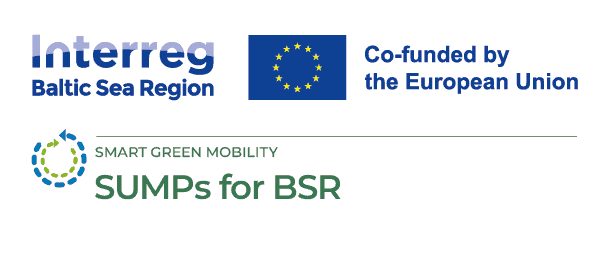
Accelerating Sustainable Urban Mobility: Highlights from the 2nd Consortium Meeting of the SUMPs for BSR Project
10 June 2024
The 2nd consortium meeting of the SUMPs for BSR project marked an important step in developing the solutions within the project. Hosted virtually, the meeting brought together project consortium members from the cities and expert institutions to mark the achievements, exchange insights, and pave the way for future endeavours.
The Model for Experimenting with Active Mobility Measures
Participants were presented with the project’s main achievements up to that date. Notably, the model for experimenting with active mobility measures was officially published and ready for local testing. This model is set to ease the establishment, implementation and monitoring of small-scale active mobility measures by providing a structured framework for experimentation and implementation.
Monitoring and Evaluation Framework
One of the main focuses of the meeting was the presentation of the activities carried out in preparation for the monitoring and evaluation framework for sustainable urban mobility planning. A detailed presentation by the University of Gdansk unveiled initial findings from the in-depth interviews with city partners. These insights l lay the foundation for the development of a data audit framework, offer baseline definition recommendations for data collection and handling and guide for SUMP indicators selection to suit the diverse needs of cities of different sizes.
Peer-Review workshop
A peer-review workshop sparked engaging discussions as city partners explored each other’s pilot plans. Through breakout sessions, participants provided constructive feedback, covering both data collection and small-scale active mobility pilots discussing risks minimisation, target group involvement and obstacles and enablers in pilot implementation. The importance of key implementation steps was emphasised.
Promoting active mobility beyond the consortium
The consortium discussed opportunities for widening the visibility of the project beyond the BSR and ensuring the durability and interest in the project development. Potential events with a wide audience such as European Mobility Week, Interreg Cooperation Day and others have been discussed. Consensus was achieved on the importance of collaborative participation, and plans were made to prepare for participation.
City Spotlight: Panevezys
A well-structured presentation by the City of Panevezys showcased their plans for monitoring methodology for pilot implementation. The presentation shed light on identifying and prioritising indicators through stakeholder and expert involvement, data collection methods, and the plan for further pilot implementation. Consortium members have been familiarised with the results of the initial primary data collection. The findings emerged during the survey, traffic flow, noise and existing bike and scooter parking infrastructure observations initiated valuable discussions and got appreciation from fellow consortium members.
Innovative Training Package Development
Advancements in the redevelopment of the training package were unveiled, followed by an interactive workshop. Consortium members actively contributed insights, validating topics, and suggesting case examples such as successful nudging methods to change mobility behaviour, presenting some urban mobility experiments such as summer street and etc. to enrich the training modules. Post-it notes on a virtual Miro board captured additional insights and case examples to enhance the training content.
Looking Ahead
As the meeting concluded, consortium members discussed on upcoming steps and outlined action plans for the approaching autumn. Warm wishes for a fruitful summer underlined the collaborative spirit of the consortium, with anticipation for continued cooperation beyond the summer break.





